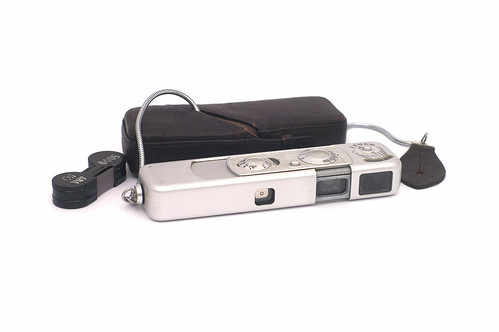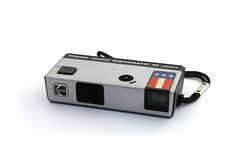Difference between revisions of "Subminiature"
(pic) |
m (per Steve Harwood request, harmonizing image-by credits under his real name) |
||
| Line 12: | Line 12: | ||
|image_align= left | |image_align= left | ||
|image_text= [[Minox B]], made from 1958 to 1971 | |image_text= [[Minox B]], made from 1958 to 1971 | ||
| − | |image_by= | + | |image_by= Steve Harwood |
|image_right= with permission | |image_right= with permission | ||
}} | }} | ||
| Line 25: | Line 25: | ||
|image_align= left | |image_align= left | ||
|image_text= A Hong Kong-made copy of the Japanese [[Hit]] | |image_text= A Hong Kong-made copy of the Japanese [[Hit]] | ||
| − | |image_by= | + | |image_by= Steve Harwood |
|image_right= with permission | |image_right= with permission | ||
}} | }} | ||
| Line 33: | Line 33: | ||
|image_align= right | |image_align= right | ||
|image_text= [[Kodak Pocket Instamatic 10|Kodak camera]] for Type No. 110 16mm film cartridges,<br/> the most popular subminiature film variant | |image_text= [[Kodak Pocket Instamatic 10|Kodak camera]] for Type No. 110 16mm film cartridges,<br/> the most popular subminiature film variant | ||
| − | |image_by= | + | |image_by= Steve Harwood |
|image_right= with permission | |image_right= with permission | ||
}} | }} | ||
Revision as of 16:28, 14 April 2011

|
| subminiature cameras image by Rick Soloway |

|
| Minox B, made from 1958 to 1971 image by Steve Harwood |
At the beginning of photography, a film format of 9×12cm or 4×5in was considered normal, so the first cameras using the 35mm film were called miniature cameras. This is why all the cameras with a smaller format have been called subminiature cameras. There was a huge variety of formats, mainly on 16mm and 9.5mm film. The most representative camera is the Minox 9.5mm.
Some people consider the 18×24mm format (half-frame format) as subminiature. The real half film format was 17.5 mm, very popular after WWII in Japan. The leading camera type for that format was the Hit. The Hit cameras were copied by dozens of camera makers.

|
| A Hong Kong-made copy of the Japanese Hit image by Steve Harwood |

|
| Kodak camera for Type No. 110 16mm film cartridges, the most popular subminiature film variant image by Steve Harwood |
Links
- Category: Subminiature cameras
External links
- Subclub
- Submin.com
- Location of Minox instruction manuals, Minolta 16mm and a few other brands
- Buy Subminiatures Online
- Subminiature cameras at Collection G. Even's site